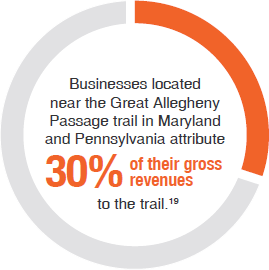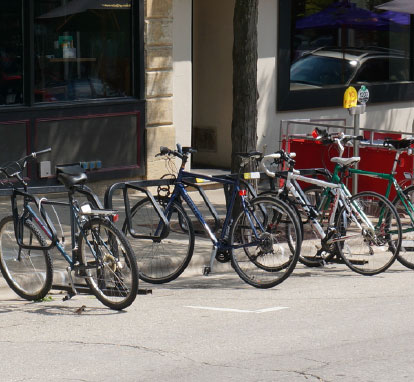Benefits of Bikeways and Trails
Well over half of Saint Paul residents and workers who responded to the survey indicated “better connections to existing bikeways, more on-street bikeways, more off-road trails, and safer street crossings” would help them bike more often. 1
92.2% of Saint Paul residents and workers say they would like to ride a bike more often than they do now.2
Four in five millennials say they want to live in places where they have a variety of options to get to jobs, school or daily needs.3
The City of Saint Paul set a goal to increase bicycle mode share from 2% in 2000 to 5% by 2025.4
The City of Saint Paul set a goal of adding 197 miles of new bikeways (a 129% increase from existing).5
MN State Statute defines a bikeway as “all bicycle lanes, bicycle routes, and bicycle paths.”
Within Downtown, the City of Saint Paul recommends an off-street bikeway network to encourage new or casual cyclists to visit downtown.
The first phase of the downtown Saint Paul bike system is scheduled for Jackson Street from Shepard Road to 11th Street in 2016.
By 2030, Saint Paul is anticipating an additional 45,000 new residents. 6
Why bikeways in downtown Saint Paul?
Goals of the Downtown Saint Paul Bikeway Network
- Enhance the economic vitality of Downtown
- Make Downtown a more attractive place for all users
- Improve the prospects for continued economic development
- Connect Downtown the broader regional bikeway system

Bikeways Support the Economy
The Midtown Greenway in the City of Minneapolis sparked $200 million in residential development after 5.5 miles of protected bikeway were built. “Per acre, the apartment buildings along the Greenway generate more than six times the tax revenue of big-box developments nearby.”7
In the Twin Cities, bicyclists using the Nice Ride bike share spent an estimated extra $150,000 at restaurants and businesses near Nice Ride stations over one season.8
Bicyclists and walkers, on average, spend similar amounts or more, and make more trips than those using automobiles at local retailers.9
Numerous studies demonstrate more customers arrive via other modes than personal vehicle than business owners are aware of. A study in New York’s Lower East Side demonstrated only 4 percent of customers arrived by car, while 23% arrived by bike. Tom Birchard, a business owner along two busy bike routes stated, “For me, bikes mean business.” 10, 11
Pat Brown relocated her art gallery in Memphis in 2008 to a more affordable space surrounded by boarded-up storefronts and 50 MPH traffic. Shortly after moving, a protected bikeway was proposed in front of Brown’s door. “We’re a retail business, so any time there’s a concept to bring additional traffic directly by your storefront, it’s very easy to say ‘yes’, Brown recalled with a laugh.” Since the protected bikeway was constructed, more than 15 new businesses opened and nearly 30 properties were renovated in a 3 year timeframe. “In the two years since we’ve just been talking about the [protected] bike lanes, we’ve seen exceptional growth – at least 50 percent per year, Brown said.” 12
In New York City, retail sales are up 16 times the area growth rate (49%) since protected bike lanes were installed and commercial vacancies have decreased. In addition, 74% of users prefer the new configuration.13
In Wichita, Kansas, when skeptical business owners “saw the temporary bike lanes and pedestrian islands in action…[almost overnight these owners] became the strongest supporters of making the bike facilities permanent.” 14
In Dallas, TX, “The impact of this bike infrastructure isn’t just safer streets. It’s a statement to the rest of the city that this is a different part of town. We’re seeing this influx of the creative class. It’s palpable and they weren’t moving here five years ago. That’s really a huge advantage. Just about every city is doing everything it can to woo the next generation, and they’re looking for better public amenities.” 15
In Long Beach, CA, over 25 businesses have moved to, opened, or expanded because of the City’s bicycling progress. 16
A trail along the Vancouver, BC seawall brings patrons to businesses otherwise unseen. General Manager, Michael Prince of De Dutch says, “Local businesses in Vancouver, especially new ones like us, depend on local traffic. People being given a reason to find you and be around your business is gold.”17
Trail visitors spend money locally: 1.7 million adults use the Washington and Old Dominion Trail in Arlington, VA, and spend about $12 million a year related to recreational use of the trail.18
The Katy Trail is a 3.5 mile trail through a densely developed section of Dallas, TX. “Builders say having a project on the Katy Trail has become a money bank. Some builders say there is a 25 percent premium for having their product back up against the trail.” 20
In North Carolina, studies show a “one-time investment of $6.7 million for a network of bike lanes has yielded an annual nine-to-one return thanks to increased bicycle tourism.” 21
Bikeways Promote Health and Wellness
Protected bike lanes decreased injuries to all street users by 58% in New York, reduced speeding, and increased sales at street front businesses. Pedestrian crashes reduced by 67%.22
Twin Cities employer Quality Bike Parts encourages employees to bike to work by providing secure bike parking, showers, and employee stipends of $3 per day for each day employees ride to work. Daily Stipends add up to approximately $45,000 per year. Employees participating in the “Bike to Work” program reduced health care costs by approximately $200,000 per year versus those employees not involved in the program.23
The “Bike to Work” program at QBP is increasing employee productivity as fewer employees are missing work days “due to health-related problems and overall health scores improving, the insurer [HealthPartners] estimates that the wellness program prevents the equivalent of $300,000 per year in lost productivity. 24
“Studies show a 4-15% increase in productivity, and 27% fewer task errors for physically fit employees” and the easiest way to promote that is through bicycling to work.25
“Cyclists, on average, live two years longer than non-cyclists and take 15 percent fewer days off work due to illness.26
Trails provide a place to engage in regular physical activity. Physical activity is associated with lower rates of diabetes, heart disease, stroke, joint and bone disease, and depression.27
What about Parking?

Bike parking spaces generate more revenue for businesses than cars because more bike parking spaces can fit into a vehicle parking space. In Melbourne, Australia, 6 bicyclists parking in one vehicle parking space spend $283 per hour, whereas a single vehicle only spends $78 per hour.28
Standing Stone Brewery in Ashland, Oregon traded a car parking space for bike parking spaces that “has definitely led to more business, says manager Danielle Amarotico. While we paid to fabricate and install the rack, it’s set the stage for customers to realize that we’re bike friendly and have gone the extra mile to promote cycling in our community.” 29
The average cost to build a single car parking space is $15,000. Basic, on-sidewalk bike parking for two spaces is between $100 and $300 to buy and install.30
![]() Download the Saint Paul Bikeway Benefits Fact Sheet
Download the Saint Paul Bikeway Benefits Fact Sheet
Resources
- 1 Saint Paul Bicycle Plan 2011 Web Survey
- 2 Saint Paul Bicycle Plan 2011 Web Survey
- 3 Survey: To recruit and keep millennials, give them walkable places with good transit and other options
- 4 City of Saint Paul, “Saint Paul Bicycle Plan”
- 5 City of Saint Paul, “Saint Paul Bicycle Plan”
- 6 City of Saint Paul, “Saint Paul Bicycle Plan”
- 7 Fisher, Thomas, “Streetscapes: Midtown Greenway spurs urban development, especially in Uptown”
- 8 University of Minnesota Center for Transportation Studies, “Nice Ride Spurs Spending Near Stations”
- 9 “The Complete Business Case for Converting Street Parking Into Bike Lanes”
- 10 Szczepanski, Carolyn, “Cities and Businesses Discover that Cycling Pays”
- 11 “The Complete Business Case for Converting Street Parking Into Bike Lanes”
- 12 Szczepanski, Carolyn, “Cities and Businesses Discover that Cycling Pays”
- 13 Szczepanski, Carolyn, “Cities and Businesses Discover that Cycling Pays”
- 14 Szczepanski, Carolyn, “Cities and Businesses Discover that Cycling Pays”
- 15 Szczepanski, Carolyn, “Cities and Businesses Discover that Cycling Pays”
- 16 Szczepanski, Carolyn, “Cities and Businesses Discover that Cycling Pays”
- 17 Szczepanski, Carolyn, “Cities and Businesses Discover that Cycling Pays”
- 18 The W & O D Trail: An Assessment of User Demographics, Preferences, and Economics
- 19 2012 Trail Town Business Survey Report
- 20 Rails to Trails Conservancy, “From Trail Towns to TrOD: Trails and Economic Development
- 21 Szczepanski, Carolyn, “Cities and Businesses Discover that Cycling Pays”
- 22 New York City DOT, “Measuring the Street: New Metrics for 21st Century Streets”
- 23 Fried, Ben, “A Bike Company Offers a Prescription for America’s Health Care Cost Crisis”
- 24 Fried, Ben, “A Bike Company Offers a Prescription for America’s Health Care Cost Crisis”
- 25 Siegel, RP, “How Bike Improves Employee Productivity”
- 26 Siegel, RP, “How Bike Improves Employee Productivity”
- 27 Centers for Disease Control and Prevention
- 28 Lee, Allison, “Changing Car Parking to Bike Parking in Melbourne”
- 29 Szczepanski, Carolyn, “Cities and Businesses Discover that Cycling Pays”
- 30 Blue, Elly, “The Economic Case for On-Street Bike Parking”